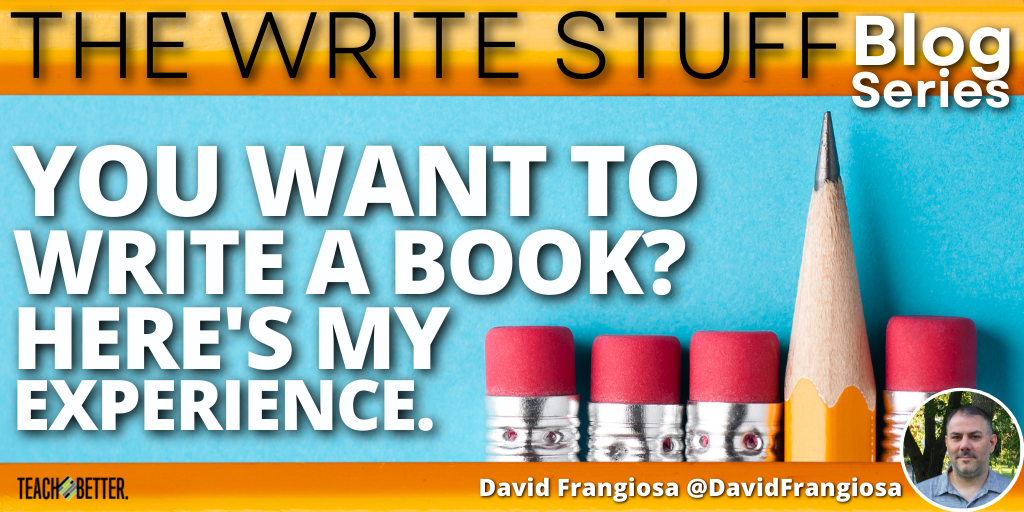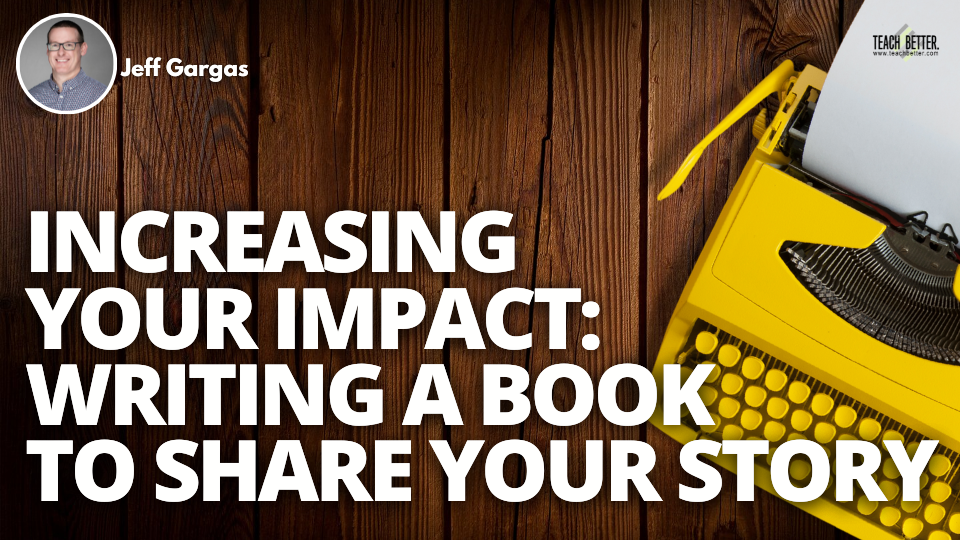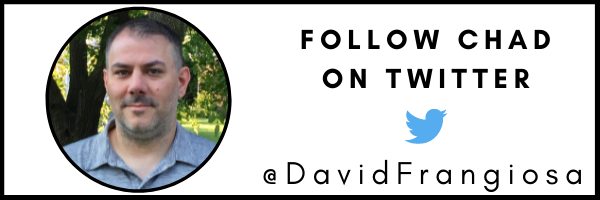TL;DR:
- Author David Frangiosa shares his experiences about writing his book Going Gradeless, Grades 6-12: Shifting the Focus to Student Learning.
- He walks us through the process from developing an idea, writing a manuscript, peer review, chapter sequence, finding the right publisher for you, and what to do after your book is published.
Writing a book has been one of the most rewarding professional experiences I’ve ever had. It challenged my thinking, made me refine my thoughts, and helped me better communicate my ideas about education. Not to mention, I’ve gotten to meet and speak with a lot of interesting people. Although this experience was overwhelmingly positive, there are some aspects that can cause some frustration and doubt if you’re not prepared for them. There are many ways to approach writing. I’m going to share my process, some of the experiences I had throughout, and hopefully, some tips that get you past your challenges.
You want to write a book? Developing an Idea
The reality here is you aren’t going to decide what to write about. It’s going to find you. Do you know more about a topic than everyone you associate with? Is there something that you do that no one else in your school is doing? Do your colleagues come to you and ask you to show them how to do certain things? Are there things that you catch heat from your colleagues for but know these practices are helping students? That last one is scary but can lead to some great places. “Every really new idea looks crazy at first” (Alfred North Whitehead). Which one of these resonates with you? Tune out the naysayers and start typing.
Writing a book has been one of the most rewarding professional experiences I’ve ever had. It challenged my thinking, made me refine my thoughts, and helped me better communicate my ideas about education. Click To TweetYou want to write a book? Writing Your Manuscript
We’re all familiar with books. We’ve read the finished products, which are the result of numerous drafts, edits, and formatting. (Just for reference, Going Gradeless was a work in progress for 6 years. Not that yours will necessarily take that long.) This can be overwhelming if you think that should be the product on your first pass.
You need to understand that you are not writing a book at first. You’re refining ideas. What are the concepts you want to cover in the book? Write everything you want to communicate about each of these. Try to be as detailed as possible and don’t edit. Just write everything you can think of and move to the next concept.
After you have all the topics drafted, go back and reread them. Read only the words that are on the paper. It sometimes helped me to read it out loud if there was something I was really struggling with. Don’t assume that readers will have the same experience you have and can infer what you mean.
Do your words paint the picture of what you’re trying to describe? Because we are so close to these topics, oftentimes there are key subtleties that we take for granted that make a world of difference to the reader. If you can identify where these details need to be added, it will provide a clearer picture for the reader. Sometimes the addition is more than a clarifying sentence or two and will require its own chapter.
You want to write a book? Peer Review
This is an important part of the process. Like I mentioned before, we are so close to this work that it is sometimes difficult to see the shortcomings. There will be some feedback that is difficult to hear, but just remember why you’re doing this. It’s important to try not to get discouraged or defensive because the sole purpose is to improve the final product. This can happen at multiple points in the process, both formally and informally. Don’t wait for the manuscript to be completed to do this. I had some trusted colleagues review the work along the way, prior to submitting it to a publisher. The publisher also sent it out for peer review when we were further along in the process.
You want to write a book? Chapter Sequence
This is a little bit of a gray area and will probably change multiple times throughout the process. This will vary based on personal preference and the nature of the book. For instance, a book that is detailing content or an event may benefit from having the research and documentation throughout the text, aligning with key details.
A book about practical application is not as straightforward. Some readers prefer to read the research all together up front and then get to the practical application of it. Others prefer the opposite. Some like it interspersed throughout the chapters. These are some of the things that will be revealed during the peer review process. It is important to hear and consider these viewpoints, but make sure the sequence tells the story you intended to tell.
You want to write a book? Finding a Publisher
Some people may think this is backward, as I’ve seen people signing book contracts for an idea before they start working on a manuscript. However, most publishers are going to want a significant writing sample before they decide, especially for first-time authors. Just understand, once you find a publisher, there are deadlines. Writing a book is a time-consuming process and I didn’t want the pressure of deadlines while I was teaching, so I didn’t look for a publisher until we had a nearly completed manuscript. Once again, it’s a matter of preference.
You have to decide what you’re looking for in a publisher. Are you looking for a publisher that will help you with every aspect of development? Do you need someone who is more focused on promoting the final product? Once you decide on who to pitch your idea to, you need to develop a prospectus. There are publishers that want an elevator pitch before they ask for this prospectus. They’re all a little different, so make sure to tailor it to the publisher. Some are more detailed than others, but they have the same basic premise. What is your experience? Who is your audience? Why does this book need to be written? Why are you the person that needs to write it? What’s your competition? For Corwin, my prospectus was 7 pages on top of the writing sample. It can seem daunting, but it’s really just a summary of everything you’ve done to date, with a few extra details.
You want to write a book? Things to Consider in a Contract
Congratulations! A publisher agreed to publish your work and you’re moving on to signing the contract. A few things to consider: What percentage are you getting from each sale? If you have a co-author or co-authors, how are you splitting this royalty? This isn’t something I negotiated. I signed their standard contract. I didn’t care about the money. That’s not why I wrote the book.
And to be honest, I still have no clue how many copies we sold or how much I’m going to make because we only get paid once a year. (I’ll update this in April when I see my first check.) However, based on the contract I signed, I’m estimating that Elise and I will probably split $1.50 a book. This is a passion project, so whatever I make from it is a bonus.
Once again, this is just my experience, so I don’t know how every publisher does this. There are different options for copyrights. You can have sole ownership, joint ownership, or the publisher can own the copyright. Corwin owns the copyright to my book, and I’m fine with that. This was clearly laid out in my contract and not something that I cared to challenge. I am allowed free use of any and all contents of the book for future work as long as the work is cited. If I were to produce any derivative work based on the book, Corwin would have the right of first refusal on that work. These conditions seemed reasonable to me and didn’t prohibit me from doing anything I wanted to moving forward, so I didn’t feel the need to own the copyright. You might feel differently. Just be aware that this is something to consider.
[scroll down to keep reading]My Book is Published. What Do I Do Now?
First, take a minute to enjoy the moment. Be proud of the accomplishment because it is not an easy journey. Now it’s time to promote your book. There are some publishers that are great with this and are pushing their books all over social media. My experience is a little different. Most of the promotion is me and word of mouth. I’m fortunate to have a network of friends on social media that have been very supportive, featuring me on their podcasts and promoting my work.
Leading up to the release of the book, I started my own blog and podcast, which I would recommend for anyone looking to publish. Not only does it help secure a contract, but it also helps spread the word and get people familiar with you. I’ve connected with a great group of educators through Teach Better and am fortunate enough to be a contributor to their blogs. I also contribute to other sites like School Rubric and Teachers Going Gradeless. Get yourself out there. Make connections. Go to conferences. The one thing to keep in mind though is this isn’t about how people can add value to you. How can you add value to them?
Good luck. I look forward to reading your book.
See the full blog series here!
About David Frangiosa
Dave is a high school science teacher from Northern NJ. He’s been performing action research on grade reform since 2015, leading to co-authoring the book Going Gradeless. He is an educational blogger and podcaster, hosting From Earning to Learning. Dave has also presented at numerous local, regional and national conferences.




